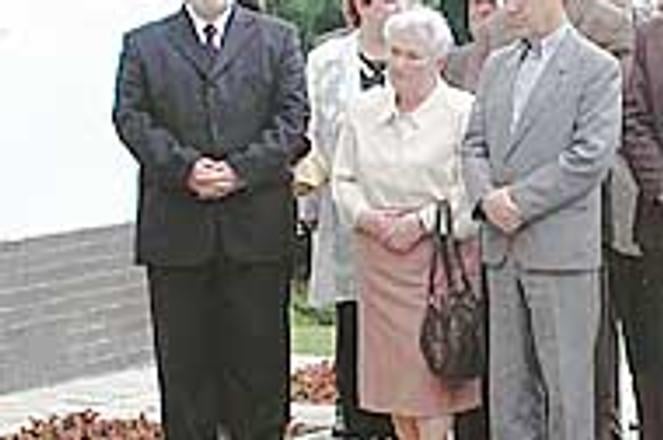AROUND 100 people attended a ceremony commemorating Vranov's 1,700 Jewish deportees.photo: TASR
VRANOV NAD TOP1OU - Sixty years ago, more than 1,700 of the Jewish citizens in this eastern Slovak town were transported to concentration camps. Only 120 survived.
On May 15, Vranov nad Top3ou, which now numbers 23,200 inhabitants, took the first steps to honour its lost citizens and preserve what little remains of their past. While the afternoon sun beat down on an audience of about 100, mostly senior citizens, a choir sang a melody describing the birth of Israel.
Standing in front of this gathering of both Jews and Christians, some from as far away as the United States, Mayor Milan Muška and Jaroslav Franek, president of the Central Union of Jewish Religious Communities (ÚZŽNO) unveiled a plaque in memory of the city's once flourishing Jewish community.
The plaque faces the location where the Jewish Synagogue stood until its demolition in 1982.
"This is just so moving," said Bobby Furst, who travelled to the ceremony from California with her sister on a search for the missing links in their family tree. The sisters, who have many relatives buried in Jewish cemeteries throughout the district, noted the significance of the event in light of recent anti-Semitic acts in Europe that have been linked to increased tensions in the Middle East.
"It is so important to do this now," one of them commented, wiping away a tear.
While nominally independent from Nazi Germany from 1939-1945, Slovakia's wartime leaders approved the deportations of some 70,000 Slovak Jews to concentration camps. The tragedy virtually destroyed the nation's Jewish community, and even today remains virtually taboo as a topic of Slovak public discussion.
After the war, few of Vranov's Jewish survivors returned to the town. Today there is no Jewish community to speak of, and the cemetery shows the effects of years of neglect - weeds, fallen headstones, and, among the living, a lack of knowledge and interest in Jewish history.
After 60 years of relative silence about the deportations, city leaders say, a young generation has grown up largely unaware that the Jewish community in Vranov once made up more than 25 percent of the town's population.
To improve local knowledge and preserve its own history, the city has produced a book called A Short History of the Jewish Population of Vranov nad Top3ou. Published in both English and Slovak, the book traces the history of the Jews in Vranov from their first arrival in the mid-18th century to the destruction of the community during the Holocaust.
In addition, the city has created a CD-Rom containing photos of more than 720 headstones from the Jewish cemetery. The documentation and preservation project began in October 2001.
Explaining the need for such records, Mayor Muška said: "We want everyone who comes to Vranov nad Top3ou to know that all our citizens are respected and welcome - those who were here, those who are here, and those who will be here."
Igor Solonik, the author of the book and an advocate of the preservation of the local Jewish cemetery, said the ceremony was the first step in a campaign to restore Vranov's downtrodden Jewish cemetery to its original stature.
"The Jewish cemetery should look like any other cemetery," he said. "We have owed that [to the Jewish population of Vranov] for the past 60 years."
Yet Solonik remains fearful that the site will suffer the same fate as that of Košice's Jewish cemetery, in which over 130 graves were damaged by three elementary school pupils over a month ago.
Despite the dangers, Jozef Weiss, director of the ÚZŽNO in Bratislava, said the community should push ahead with commemoration efforts nationwide, among other things to help Slovakia come to terms with its neglected world war two history.
"This is something that every city should do. Vranov should be only the first."
Author: Jessica Rosen

